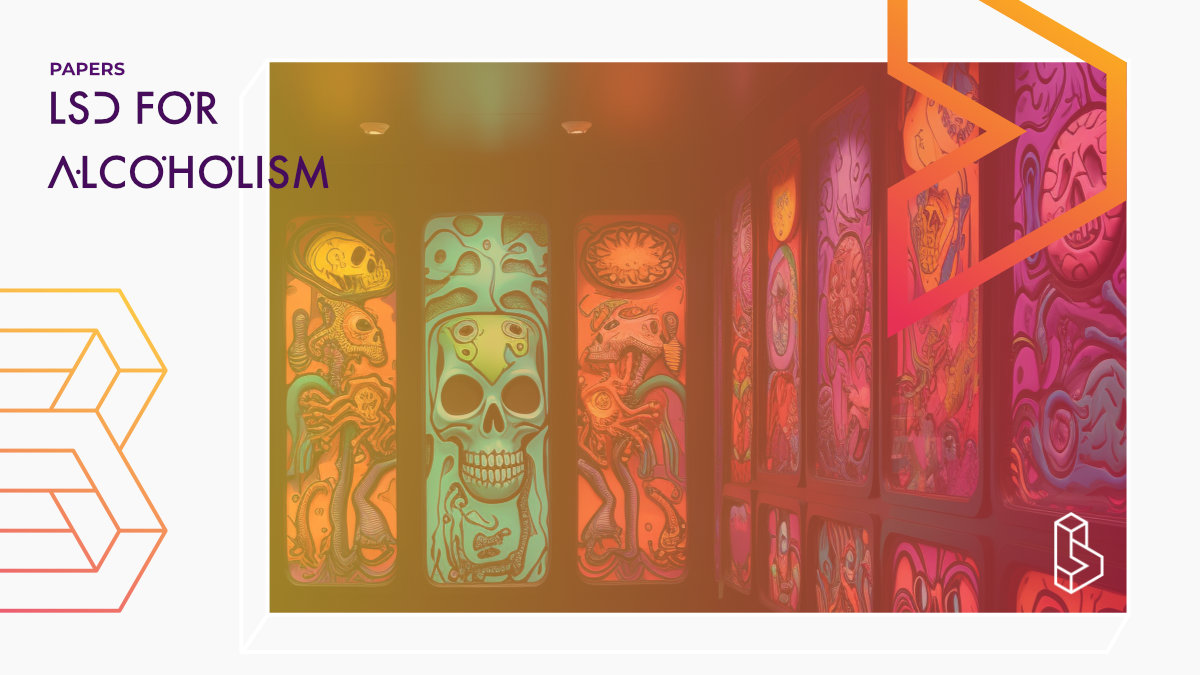This very stringent meta-analysis (including 6 trials, n=536) concludes that a single session/dose of LSD treatment has short-term (<6 months) effects on alcoholism (less misuse, more abstinence) but no positive long-term outcomes (>12 months).
Abstract of LSD for Alcoholism
“Assessments of lysergic acid diethylamide (LSD) in the treatment of alcoholism have not been based on quantitative meta-analysis. Hence, we performed a meta-analysis of randomized controlled trials in order to evaluate the clinical efficacy of LSD in the treatment of alcoholism. Two reviewers independently extracted the data, pooling the effects using odds ratios (ORs) by a generic inverse variance, random effects model. We identified six eligible trials, including 536 participants. There was evidence for a beneficial effect of LSD on alcohol misuse (OR, 1.96; 95% CI, 1.36–2.84; p = 0.0003). Between-trial heterogeneity for the treatment effects was negligible (I² = 0%). Secondary outcomes, risk of bias and limitations are discussed. A single dose of LSD, in the context of various alcoholism treatment programs, is associated with a decrease in alcohol misuse.”
Authors: Teri S. Krebs & Pål-Ørjan Johansen
Notes on LSD for Alcoholism
LSD might be used in the treatment of alcoholism, at least “in combination with psychosocial interventions, [it] can help to prevent a relapse of alcohol misuse, for example, by eliciting insights into behavioural patterns and generating motivation to build a meaningful sober lifestyle.”
It has been used successfully in the past, but with the war on drugs (as a reaction to the counterculture of the 1960s) this treatment didn’t get much attention.
The study included the following randomized controlled trials “(Bowen et al., 1970; Hollister et al., 1969; Ludwig et al., 1969; Pahnke et al., 1970; Smart et al., 1966; Tomsovic and Edwards, 1970), including additional reports on three of the trials (Kurland et al., 1971; Ludwig et al., 1970; Smart et al., 1967).” (the search looked ahead as far as 2010)
“The six eligible trials included a total of 536 adults; of these 325 (61%) had been randomly assigned to receive full-dose LSD and 211 (39%) to a control condition.”
“Single oral doses of LSD ranged from approximately 210 mcg (3 mcg/kg) to 800 mcg, with a median dose of 500 mcg.” This is considered a very high/heavy dose (see Erowid).
“There was a significant beneficial effect of LSD on alcohol misuse in the short-term and medium-term, which was not statistically significant in the long-term.” The same was true for the effect of LSD on abstinence from alcohol (no effect at 12-month follow-up).
It’s positive to note that “no trials reported any detrimental effects of LSD on psychosocial functioning or other outcomes.” This is one of the big worries for research with psychedelics, that during the treatment of one condition (be it alcoholism, depression, or something else), the patients have (larger) adverse effects from the psychedelic.
The authors conclude that LSD treatment does have short-term positive effects for alcoholism, but that in the long-term one dose of LSD (and the related treatment) doesn’t have a significant effect. They mention various reasons (and limitations) and one that pops out is the lack of repeated dosages/treatments.
The paper ends with: “We need further data on whether subgroups of individuals exist for whom LSD present an increased beneficial effect or risk for adverse events. Future clinical trials could combine a range of doses of LSD with current evidence-based alcohol relapse prevention treatments. As an alternative to LSD, it may be worthwhile to evaluate shorter-acting psychedelics, such as mescaline, psilocybin, or dimethyltryptamine.”
Summary of LSD for Alcoholism
Alcohol misuse causes more overall harm than any other drug, and many users find it challenging to stop drinking.
Numerous clinical investigators have claimed that treating alcoholics with lysergic acid diethylamide (LSD) in combination with psychosocial interventions can help to prevent a relapse of alcohol misuse. However, no systematic review and meta-analysis has been performed.
Find this paper
Lysergic acid diethylamide (LSD) for alcoholism: meta-analysis of randomized controlled trials
https://doi.org/10.1177/0269881112439253
Open Access | Google Scholar | Backup | 🕊
Cite this paper (APA)
Krebs, T. S., & Johansen, P. Ø. (2012). Lysergic acid diethylamide (LSD) for alcoholism: meta-analysis of randomized controlled trials. Journal of Psychopharmacology, 26(7), 994-1002.
Study details
Compounds studied
LSD
Topics studied
Addiction
Alcohol Use Disorder
Study characteristics
Meta-Analysis
Participants
536
Humans

